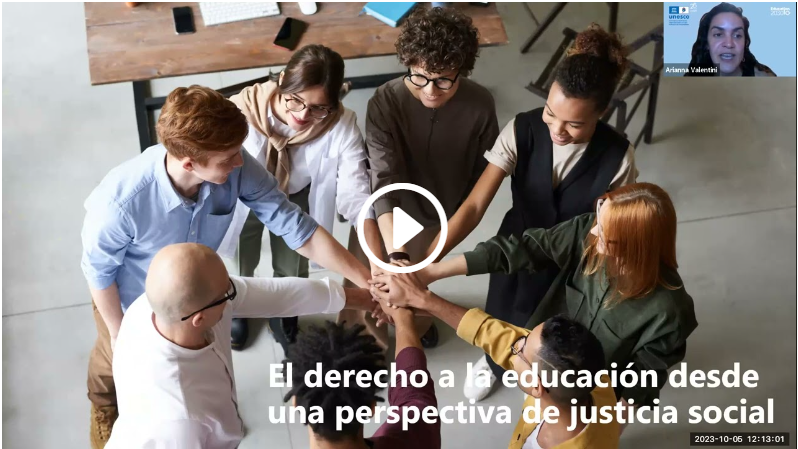Los estudiantes del Hemispheric University Consortium tuvieron la oportunidad de participar en dos seminarios, uno en inglés y otro en español, los días 4 y 5 de octubre de 2023 conducidos por el equipo de la UNESCO IESALC.
Esta extraordinaria actividad virtual brindó la oportunidad a aquellos estudiantes universitarios de primera generación; a los que reciben becas del Estado; y/o a los que su lengua materna es originaria para compartir sus experiencias y los desafíos que han vivido durante el acceso y permanencia en la educación superior. Las conversaciones se llevaron a cabo en breakout rooms de manera íntima y confidencial donde los estudiantes pudieron también proponer soluciones.
Respecto a la barreras mencionadas por los estudiantes destacan la complejidad que les implica dejar su comunidad y adaptarse a una nueva ciudad; su situación económica porque algunos de ellos tienen la necesidad de trabajar dado que las becas no contemplan los otros costos que tienen que enfrentar como vivienda, comida y pasaje; el que no tienen una buena educación previa que les hace difícil pasar las pruebas de admisión y sacar buenas calificaciones cuando ingresan; que en algunas escuelas públicas no les enseñan idiomas; el que no cuentan con apoyo psiquiátrico que les ayude a cuidar su salud mental; y que los procesos para ingresar a las universidades son burocráticos y caros.
Los estudiantes también presentaron soluciones que ayuden a mejorar su acceso y permanencia. Comentaron acerca de que las universidades deben dar mayor difusión a las becas que ofrecen y crear otros mecanismos o apoyos para que los estudiantes puedan tener un ingreso extra para poder enfrentar sus gastos adicionales; brindar información a los padres de familia para que tengan un mayor entendimiento de los desafíos de la vida estudiantil de sus hijos y puedan apoyarlos; tener acceso a algunos apoyos como guarderías para niños para aquellos estudiantes que tengan familia; crear redes de ayuda con estudiantes, docentes de secundaria, psicólogos para apoyarlos en su proceso de selección de carrera e ingreso a la universidad; ofrecer talleres o cursos a los estudiantes de primer grado que les permitan nivelarse en las áreas que tienen dificultad; crear mecanismos que les permitan el acceso a otros idiomas; ofrecer cursos con horarios y modelo flexibles para que puedan trabajar; y dar un mayor seguimiento al estado emocional del estudiante con campañas de salud mental, líneas telefónicas, oficinas de apoyo para que puedan recibir atención psicológica y médica.
Para la UNESCO la educación superior es un derecho, es parte del derecho a la educación a lo largo de la vida.
La primera parte del seminario fue impartida por Arianna Valentini, UNESCO IESALC Policy Analyst. La grabación se encuentra disponible aquí: https://youtu.be/3_WcoanIevc?si=liFg9wpwyEWjwk1W
El resto de las actividades se llevaron en colaboración con el equipo de HUC GLEE (HUC Global Learning Experiences and Engagement).
Agradecemos esta colaboración con UNESCO IESALC por brindarle esta oportunidad a nuestros estudiantes de escuchar su voz.
Students share their experiences with UNESCO IESALC and propose solutions to promote the right to higher education
Hemispheric University Consortium students had the opportunity to participate in two seminars, one in English and one in Spanish, on October 4-5, 2023, conducted by the UNESCO IESALC team.
This extraordinary virtual activity provided the opportunity to those first-generation college students; to those who receive State scholarships; and/or those whose mother tongue is native to share their experiences and the challenges they have experienced during access and permanence in higher education. The conversations took place in breakout rooms in an intimate and confidential manner where students were also able to propose solutions.
Regarding the barriers mentioned by the students, they highlighted the complexity of leaving their community and adapting to a new city; their economic situation because some of them have the need to work since the scholarships do not consider the other costs they have to face such as housing, food and transportation; those who do not have a good previous education, which makes it difficult for them to pass the admission tests and get good grades when they enter; that in some public schools they do not teach them languages; those who do not have psychiatric support to help them take care of their mental health; and that the processes to enter universities are bureaucratic and expensive.
The students also presented solutions that may help improve their access and permanence. They commented that universities should give greater promotion to the scholarships they offer and create other mechanisms or supports so that students can have extra income to be able to face their additional expenses; provide information to parents so that they have a greater understanding of the challenges of their children’s student life and can support them; have access to some supports such as childcare for those students who have families; create support networks with students, secondary school teachers, psychologists to support them in their career selection process and university admission; offer workshops or courses to first-grade students that allow them to level up in the areas that they have difficulty; create mechanisms that allow them access to other languages; offer courses with flexible schedules and models so they can work; and provide greater monitoring of the student’s emotional state with mental health campaigns, telephone lines, and support offices so that they can receive psychological and medical care.
For UNESCO, higher education is a right, it is part of the right to education throughout life.
The first part of the webinar was given by Arianna Valentini, UNESCO IESALC Policy Analyst. The recording is available here: https://youtu.be/3_WcoanIevc?si=liFg9wpwyEWjwk1W
The rest of the activities were carried out in collaboration with the HUC GLEE (HUC Global Learning Experiences and Engagement) team.
We appreciate this collaboration with UNESCO IESALC for providing this opportunity for our students to hear their voices.

